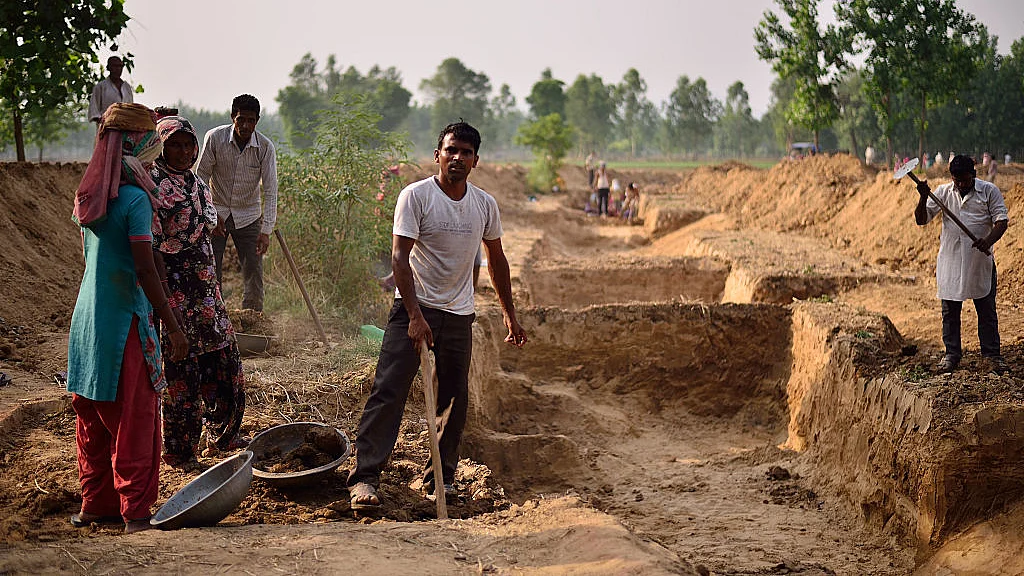Another state function usurped by the Centre, say activists
State Governments are charged with the implementation of the rural employment guarantee Act but the Union Government has been manipulating the MIS without taking states into confidence, say activists

Alleging that the Union Government is neither consulting the states nor informing people before imposing restrictions, modifying rules and reducing entitlement of beneficiaries of the Mahatma Gandhi National Rural Employment Guarantee Act (MGNREGA), People’s Action for Employment Guarantee on Thursday called upon the Government to stop manipulating the Management Information System (MIS).
Acknowledging that the online Management Information System (MIS) of MGNREGA is one of the most impressive initiatives of the central government to bring transparency in the programme, the network comprising more than 150 civil society groups lamented alleged arbitrary acts by the Union Government in manipulating details of all Job Cards, Muster Rolls and wage and material payments which are found on the MIS.
Over the past few years, the Ministry of Rural Development has increasingly linked the implementation of MGNREGA to the MIS and is now manipulating this online system to influence the programme in insidious ways, the network claimed in a statement. In some cases, they said, these are tantamount to backdoor amendments of the Act, and in any case violation of the Act. These are done without any consultation, with little transparency and are noticed only in retrospect after workers adversely feel the damage caused by them.
The following are some examples the statement gives claiming how the tweaking of the MIS is violating workers’ legal entitlements:
Work allocated does not mean work done: Given the 100 day entitlement is for the period of one financial year, most workers aim to complete 100 days around this time of the year. Note that allocation of employment does not necessarily imply work done as workers may be absent on some of the days on which they have been allocated work for various reasons. This modification in the MIS is particularly affecting states which follow the practice of issuing seven-day Muster Rolls and designating one of these days as a holiday on which all workers on the Muster Roll are marked absent. So workers are simply disallowed to complete 100 days of work and claim their full entitlement for no fault of their own.
Schemes closed under pressure to show ‘results’: Once schemes are physically completed and all wage and material payments are made in them, they are to be “closed” in the MIS. However, till last month state governments had the option of reopening closed schemes in the MIS. This is an important safeguard, required for making pending payments in case schemes are closed in the MIS before paying all the workers who have worked or the vendors who have supplied material. In this financial year alone, some states reopened thousands of schemes to pay workers as schemes had been closed in a hurry because of intense pressure from the Ministry to increase the rate of scheme completion in the MIS.
Not allotting work to households whose photographs have not been uploaded in the MIS: States are being repeatedly asked to “verify” Job Cards in the MIS. According to the Ministry, a Job Card is considered verified if (1) photograph of at least one member of the household is uploaded on the MIS; (2) details of work demanded, allocated and done by the household and wages received by the household are updated in the physical Job Card and (3) the physical Job Card has been verified. For several days in 2016, the Ministry had put a check in the MIS which prevented allocation of work to households whose Job Card had not been verified.
Blocking material payments: For several weeks last year, the Ministry had closed the option of material payments during the period of high demand for MGNREGA work to curb expenditure on the programme. This not only caused widespread delays in completion of works but also caused many wells to collapse as they could not be completed before the rains because of the absence of material.
Removal of the report on unemployment allowance: Several months ago, the Ministry removed the report on unemployment allowance from the MIS. This makes it extremely difficult to monitor payment of this entitlement in case workers demanding employment are not given work within 15 days.
Modifying the report on compensation for delays in wage payment to not reveal the reason for rejection of compensation: Workers who are not paid their wages within 15 days of doing work are entitled a meagre compensation of 0.05% of the payable wages per day of the delay.
The compensation amount is to be calculated automatically by the MIS based on the last day of the Muster Roll and the date of signing of the Fund Transfer Order (FTO) by the second signatory.
Not only is the compensation calculated by this method incomplete (as it does not include the time lag between the signing of the FTO and the crediting of wages in the worker’s account), the central government also gives Programme Officers the discretion to “reject” compensation after choosing the reason for rejection. However, for the past several months, the Ministry has removed from the MIS the report on reason for rejection of compensation, which has made it impossible to hold Programme Officers accountable for their decision.
All these manipulations to the MIS are being made without any prior information to the implementing state governments, or proactively disclosed to people. This violates the rights of MGNREGA workers and amounts to backdoor amendments in some cases.
Follow us on: Facebook, Twitter, Google News, Instagram
Join our official telegram channel (@nationalherald) and stay updated with the latest headlines
